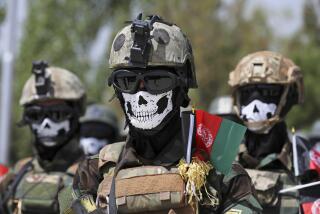RAND Tells of Soviet Drug Use in Afghanistan : Grim Existence in Afghanistan for Soviets Told
- Share via
The Soviet army in Afghanistan suffered from widespread drug abuse, internal conflict and desertions by soldiers fed up with primitive health care and hygiene, a RAND Corp. study released today said.
The report, based on interviews with 35 Soviet war veterans as well as talks with Afghan resistance leaders and an extensive survey of Soviet military literature, was prepared by the Santa Monica-based think tank’s Army-sponsored Arroyo Center.
For the record:
12:00 a.m. May 30, 1988 Los Angeles Times Monday May 30, 1988 Home Edition Metro Part 2 Page 5 Column 4 Metro Desk 1 inches; 25 words Type of Material: Correction
Editor’s Note: The article, “Are You Risking Your Health” in the May 23 Science/Health pages was adapted from the May University of California, Berkeley Wellness Letter.
The report, “Inside the Soviet Army in Afghanistan,” is billed as the first systematic examination of Soviet armed forces in post-World War II combat incorporating substantial firsthand information.
Author Alexander Alexiev and his RAND colleagues interviewed Soviet defectors and prisoners of war from a variety of military specialties, ranks and ethnic backgrounds who served in Afghanistan at various times between 1980 and 1987.
The study found:
--Drug use was so widespread, with more than 50% of Soviet personnel said to be regular users, that it will likely have a negative effect on Soviet society long after the troop withdrawal is completed.
--Disease, often caused by extremely poor hygiene, may have claimed more casualties than the bullets of the U.S.-supported moujahedeen Muslim resistance fighters, while inadequate living conditions and isolation also sapped health and morale.
Slayings, Desertions Common
--Fragging (murder between servicemen) and desertions appeared “fairly common (with) scattered evidence of open and even organized insubordination.” The victims of the fragging were typically other servicemen rather than officers.
--Soviet officers instigated reprisals and brutality against the civilian population in violation of international conventions even as they punished troops engaged in “free-lance” looting and atrocities.
--Ethnic conflicts in the ranks, particularly between Soviet Muslims and the Slavic majority, were a continuing problem.
The study also found that the estimated 115,000 troops were psychologically ill-prepared for service in Afghanistan.
Before being shipped to Afghanistan, troops were often told that they had been invited by the Afghan people and would be fighting foreign mercenaries. Once there, they were instructed to regard every Afghan, including women and children, as a potential enemy.
The study said desertion totals were unavailable, but more than 100 Soviet servicemen are known to have successfully defected to the moujahedeen.
More to Read
Sign up for Essential California
The most important California stories and recommendations in your inbox every morning.
You may occasionally receive promotional content from the Los Angeles Times.









